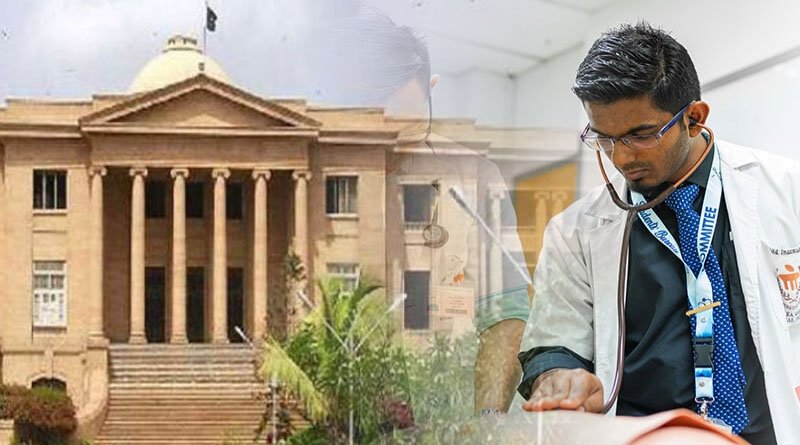SMBBMU, DUMHS to refuse Pakistani students on the basis of their two-year foreign higher secondary education has been overturned by the SHC.

The decision of the Shaheed Mohtarma Benazir Bhutto Medical University (SMBBMU) in Larkana and the Dow University of Medical & Health Sciences (DUMHS) in Karachi to refuse Pakistani students on the basis of their two-year foreign higher secondary education has been overturned by the Sindh High Court (SHC).
Despite having valid domicile and permanent resident certificates, petitioners Nawal and Hiba Rehan complained to the court that the DUMHS and the SMBBMU had denied them open merit medical admissions (PRCs).
According to the petitioners’ attorney, the health department had effectively designated prospective Pakistani applicants who had completed two years of foreign education outside of the nation and obtained their higher secondary school diploma or an equivalent certificate from another country as overseas Pakistanis for the 2021–22 academic year and limited their eligibility to the seats set aside for that category.
The petitioners, according to him, are Pakistani citizens by birth, permanent residents of Karachi, and holders of the necessary domicile certificates and PRCs. He claimed that, as such, they are qualified to apply for admission to MBBS programs at public sector colleges on the basis of general merit.
He continued by saying that although the petitioners had passed the Medical and Dental College Admission Test, their admission applications had been rejected because they had studied abroad for the previous two years and received the same higher secondary education in Saudi Arabia.
The lawyer claimed that an unfair distinction had been made between the petitioners and other applicants who were Pakistani citizens, similarly residing in Sindh, and holding the necessary PRCs, disqualifying them based solely on a foreign educational background.
The Pakistan Medical Commission (PMC) and the relevant educational institutions’ attorneys were left to defend their positions against the petitioners’ claims because the provincial law officer made no serious effort to provide a proper justification for the challenged classification.
In accordance with the PMC Medical & Dental Undergraduate Education (Admission, Curriculum, and Conduct) Regulations, 2021, which included overseas Pakistanis within the meaning of that term, the impugned categorization, according to the PMC’s legal counsel, violates the definition of a Pakistani student.
According to the current PMC regulations, no distinction could be made between local students and students from Pakistan who were studying abroad because the fees were required to be the same in both situations.
The DUMHS and SMBBMU‘s legal representatives defended the challenged classification and claimed that the petitioners’ applications were turned down because of their two most recent years of study abroad.
They claimed that local students who had received their education in Pakistan through the public sector school system would not be able to compete against overseas Pakistanis and would therefore be marginalized in response to a court’s inquiry about the justification for such classification.
An SHC division bench made up of Chief Justice Ahmed Ali M. Sheikh and Justice Yousuf Ali Sayeed stated after hearing the arguments that the claim made by the universities’ attorneys to support the challenged classification amounts to a damning indictment of the overall quality of education in the nation.
The bench stated that while a distinction between local Pakistanis and people who are overseas Pakistanis may be made for admission purposes, the latter category cannot be broadened through the impugned classification solely on the basis of two years of foreign education in order to include people who are Pakistani citizens and otherwise meet the requirements, and thus exclude them from applying for general merit seats.
The court ruled that the contested classification is arbitrary and cannot be used in the prospectus as a tactic to disqualify a Pakistani citizen who is otherwise qualified.
The bench ruled that although a similar provision could be made to reserve some seats for people with disabilities or those from a specific region, that wouldn’t mean that a Pakistani citizen who otherwise meets the requirements for either category could be prevented from applying on the basis of general merit and only be allowed to apply for a reserved seat.
The court instructed the relevant authorities to process the petitioners’ applications for admission under the general merit category, provided that they otherwise met the requirements, and to accommodate them against any suitable open seats in the event that they, or any of them, as the case may be, are found to be eligible for a seat based on their placement on the overall merit list.
